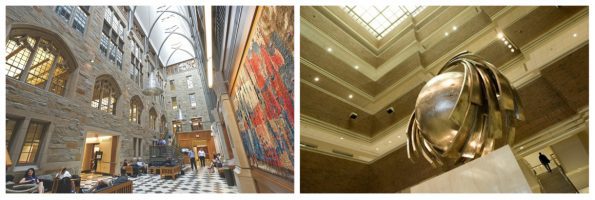The Politics of Purchases, Grocery Chain Rebuilds, and More – Boston News

Let’s explore some of the most interesting stories that have emerged from Boston business schools this week.
Why U.S. Grocery Chains Need More (and Better) Store-Brand Products – Harvard Business Review
Harvard Business Review recently revealed new insights into how store-brand products enable grocers to carve out a niche for themselves among more established competitors.
According to writers Marcel Corstjens and Rajiv Lal, “private-label products are essential to the profit margins of hard discounters,” like Wal-Mart, which typically sell 90 percent private-label goods compared to 15-51 percent of ordinary grocery stores, depending on where you are in the world. “Hard discounters win by only stocking products with a very high rotation.”
The two point to the miraculous feat of French supermarkets, which regained a significant market share after stores began “offering affordable goods of reasonable quality.”
In order for U.S. grocers to compete with hard discounters, the article notes that they “will have to offer private-label goods of the “right” quality at the “right” price. No easy feat, indeed.
You can read more from Corstjens and Lal here.
How Going Out Can Spur Outside-the-Box Thinking – MIT Sloan Newsroom
New research from MIT Sloan Assistant Professor of Work and Organization Studies Jackson Lu finds that people who have “had a close friendship or romantic relationship with a person from a culture drastically different from [their] own tend to exhibit higher creativity, innovation, and entrepreneurship.”
“‘Going Out’ of the Box: Close Intercultural Friendships and Romantic Relationships Spark Creativity, Workplace Innovation, and Entrepreneurship” suggests that “people cannot simply ‘collect’ intercultural relationships at a superficial level, but instead must engage in cultural learning at a deep level.”
Lu writes:
“When in an intercultural relationship, an individual should not eschew cultural differences but rather embrace them, because such differences enable one to discern and learn the underlying assumptions and values of both the foreign culture and the home culture. Without close social interactions, it can be difficult for individuals to juxtapose and synthesize different cultural perspectives to achieve cultural learning and produce creative insights.”
You can check out the rest of the article here.
How We Play Politics in the Store Aisles – Carroll School News
In a new Journal of Consumer Research study, Carroll Assistant Professor of Marketing Nailya Ordabayeva finds that “conservatives buy products they believe will signal their own superiority (big-name brands, high price tags) while liberals buy products they hope will show their uniqueness (unconventional colors or design).”
Ordabayeva’s research has “startling implications regarding the extent of our national polarization,” suggesting that people are paying very close attention to taglines like Mercedes’ “A Class Ahead” and Apple’s “Think Different.”

Professor Ordabayeva’s research finds that conservative and liberal Americans have decidedly different buying patterns, with conservatives favoring well-known brands and liberals opting for more creative choices.
“Better or Different? How Political Ideology Shapes Preferences for Differentiation in the Social Hierarchy,” can be found here and check out the rest of the entry on Carroll School News here.
Boston College Announces MBA Deadlines for 2018-19

The newest batch of Boston College MBA deadlines dates have been announced for the Carroll School of Management, going in to the 2018-19 academic season.
Round One
Deadlines: September 17, 2018
Notifications: December 5, 2018
Round Two
Deadlines: January 7, 2019
Notifications: March 15, 2019
Round Three
Deadlines: March 15, 2019
Notifications: May 1, 2019
Round Four (Final)
Deadlines: April 15, 2019
Notifications: June 5, 2019
Head over to the official BC Carroll website for more application information.
HBS Reviews Elon Musk’s Compensation Plan, and More – Boston News

In case you missed it, let’s explore some of the most interesting stories that have emerged from Boston business schools this week.
Elon Musk’s Unusual Compensation Plan Isn’t Really About Compensation at All – Harvard Business Review
Harvard Business School faculty member George Serafeim, the Jakurski Family associate professor of business administration, recently published his insight into the compensation package Tesla shareholders awarded CEO Elon Musk this year—“likely the largest compensation package ever awarded to a CEO.”
Serafeim argues that the design of the compensation plan and its announcement were about “signaling a credible commitment to Tesla’s purpose: to become a clean energy giant that helps address climate change by transforming mobility. To get there, Musk needs not only the normal sort of investor confidence, but also for investors to buy into his radical vision for the company.”
Serafeim further explains:
“Musk’s compensation plan, with its ambitious targets for market capitalization, focuses the mind on exactly this vision. For Tesla to reach a $650 billion valuation by 2028, the market will have to shift dramatically, with electric vehicles becoming the overwhelming percentage of all new sales. That would boost Tesla revenues from both vehicles and batteries. Such a future would also likely require that Tesla’s autonomous pilot technology becomes state-of-the-art, allowing it to be used safely and widely in Tesla vehicles but also potentially through licensing by other players.”
You can read more about Serafeim’s insight here.
Finance by Day, Pro Soccer by Night – Carroll School of Management News
The Boston College Carroll SOM recently profiled Issey Maholo ’07, a polymath who spends his days as VP of prime brokerage for J.P. Morgan and his nights as goalie for the Hong Kong Football Club.
Maholo, a native of Tokyo born to a Congolese father and Japanese mother, writes, “There will be plenty of excuses you can make in life as to why you should stop doing what you love to do.” He also notes the parallels between his vocation and avocation, particularly when it comes to teamwork:
“One person can shape a game, but usually not a whole season. It’s the same in finance—someone can bring in a big mandate, but you all have to pull together to become the top bank in Asia.”
You can read more about Maholo here.
The Quest for Error-Free Care – Sawyer Business School Blog
The Suffolk University Sawyer Business School recently hosted a panel discussion sponsored by the Suffolk University Chapter of the Institute for Healthcare Improvement (IHI), which touched upon “trends in the industry, patient safety, how the patient experience has improved over the decades, job-hunting advice, and many other subjects.”
The talk featured three Boston health care leaders: Lahey Hospital and Medical Center Chief Quality and Safety Officer Dr. Judith Melin; Mass General Hospital Associate chief quality & safety officer Mary Cramer; and Professor Elizabeth Turner, a nurse-attorney whose practice focuses on health care law.
Professor Mona Al-Amin, faculty adviser to the IHI group, writes, “The importance of this event was that students learned about quality improvement in healthcare organizations. They also got to ask questions about the field. And they got to learn about career choices and what skills they might need.”
You can read all the takeaways from the discussion here.
MIT Sloan Debunks Entrepreneur Myths, and More – Boston News

Let’s explore some of the most interesting stories that have emerged from Boston business schools this week.
The 20-Year-Old Entrepreneur is a Lie – MIT Sloan Newsroom
MIT Sloan School of Business professor Pierre Azoulay and Ph.D. student Daniel Kim used a new working paper as an opportunity to debunk the myth of the 20-year-old Silicon Valley tech-prodigy entrepreneur. The reality is that the average age of successful entrepreneurs veers closer to 42. Azoulay elaborates:
“If you knew nothing else, and you had two identical ideas, one proposed by a very young person, one proposed by a middle-aged person, and that’s the only thing you have to go on, you would be better off—if you wanted to predict success—betting on a middle-aged person.”
Kim adds: “In theory, we know that with age a lot of benefits accumulate. For instance, you get a lot of human capital from experience, you also get more financial resources as you age, as well as social connections, all of which will likely boost your odds of success as an entrepreneur.”
Read more about the duo’s research here.
Case Study: Can This Japanese Snack Food Company Break into the U.S. Market? – Harvard Business Review
As part of a fictionalized case study, HBR recently published a profile on Kenko USA, the American subsidiary of Japan’s largest rice cracker producer, about its ongoing plans to enter the American market. Kenko USA hopes to become synonymous with rice crackers much in the same way that Kikkoman became inextricably linked with soy sauce.
In 2012, Riku Nakamura relocated from Tokyo to San Mateo, California to oversee the launch of Kenko’s first foreign subsidiary. According to the article, “Riku knew that the key was to expand beyond Asian supermarkets and grocery stores’ “international” sections and get Kenko crackers into the snack aisles of mainstream U.S. food outlets, but his team’s efforts had yet to bear fruit.”
You can read the entire case study here.
Hybrid Strategy Leaves Auto Industry Leaders Playing Catch-up, Professor Says – D’Amore McKim News & Research
There’s quite a bit of chatter within the auto industry about the so-called “hybrid trap” in which established industry leaders have been forced to catch up to the hybrid strategies of more aggressive startups to varying degrees of success.
Northeastern University D’Amore-McKim School of Business‘ Jean C. Tempel professor of entrepreneurship and innovation Fernando Suarez explored this phenomenon in detail as part of an MIT Sloan Management Review article. He elaborates:
“Most established corporations follow the hybrid approach because it gives them peace of mind. It allows incumbents to convince themselves that they’re responding to technology-driven transformation in their industry when, in fact, they’re losing ground. They fall back on learned patterns, which slows development. When you are serious about going the route of new technology, you have to rethink all of your designs and processes.”
Read more about Suarez’s research here.
MBA Battle: BU Questrom v. BC Carroll

Boston College and Boston University are two of the metro’s most popular and recognizable schools. But for two schools with a lot in common, BU and BC don’t seem to like each other much. Continue reading…
BC Talks About the Wealth Divide, and More – Boston News

Let’s explore some of the most interesting stories that have emerged from Boston business schools this week.
The Wealth Divide – Boston College Magazine
With the wealth gap in the United States wider than at any point since the Great Depression, the discussion about income inequality has been hitting closer and closer to home for many. The ever-reaching effects of inequality can start right at the beginning of someone’s life, according to research from Boston College Carroll School of Management assistant professor Sean Martin.
Martin’s 2016 research in The Academy of Management Journal explores the link between social class and leadership. Entitled “Echoes of Our Upbringing,” Martin and his coauthors, University of Toronto’s Stéphane Côté and West Point’s Todd Woodruff, uncovered “connections between how much money leaders grew up with, their narcissism, and negative reviews from their subordinates” among 299 recent West Point graduates,” according to Boston College Magazine.
“To the extent that people grow up wealthy, they’re more likely to exhibit narcissistic tendencies, and narcissistic tendencies lead people to engage in fewer leadership behaviors that we would consider prototypical and more effective. And as a result, their performance suffers.”

“My own understanding is that we’re kind of in some real trouble here.” – Carroll Assistant Professor Sean Martin on the current state of income inequality.
You can read more about the study and Martin’s experience from living in his car, to earning his Ph.D. at Cornell here.
What Opening a Nonprofit Grocery Taught the Former President of Trader Joe’s – MIT Sloan Newsroom
As part of MIT’s recent Sustainability Summit, Trader Joe’s president Doug Rauch discussed how his new venture, Daily Table, attempts to tackle “food insecurity” and still keep prices low by sourcing “its food from farmers, factories, and supermarkets, through donations of excess food, ‘imperfect’ food, and reduced purchase prices.” Rauch shared some of the lessons he gleaned after receiving community feedback on his new enterprise:
“I’m told over and over again, how good they feel: I’m providing this for my family. I can now finally come in, buy the foods I’m supposed to be eating, I feel good about what we’re feeding our families. It is so fundamental to the human need we all have, which is for respect for dignity.”
Learn more about Rauch’s plans for Daily Table here.
Those Taxing New Tax Laws – Sawyer Business School Blog
The Suffolk University Sawyer Business School recently published an interview with professor of taxation Michaele Morrow, Ph.D., CPA, who offered a nuanced analysis of the changes people can expect as a result of the recent tax reforms. She writes:
“Congress is only focused on short-term effects. In fact, the tax cuts for individuals are scheduled to expire in seven years, so this isn’t true reform. First, Congress limited the dollar amount of state and local taxes that can be deducted to $10,000. At the same time, Congress increased the standard deduction to $12,000 for a single person and $24,000 for a married couple. Essentially, this means that fewer people will have expenses that exceed those standard deduction amounts, so many more will itemize.”
You can read more about Morrow’s take on the new U.S. tax reforms here.
